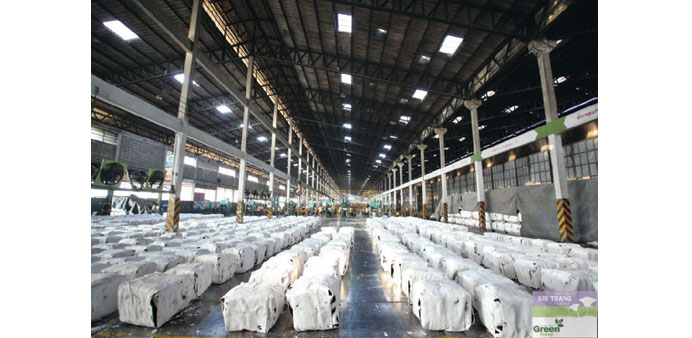Reuters
Singapore
Sri Trang Agro-Industry and other leading rubber producers in Asia plan to raise prices sharply, ditching a system of pegging them near the benchmark set by the SICOM exchange in Singapore.
Producers and industry bodies said they are ready to charge a significant premium over the exchange-traded futures contract from the second half of 2015, marking a radical change in an industry where plunging prices have hit farmers hard.
Halcyon Agri Corp, which together with top producer Sri Tang accounts for nearly a fifth of global output, is also involved, along with at least eight other growers in Thailand and Indonesia.
“If this move is followed through with action it could change the mood and tone of the market. It would be a game-changer,” said Paitoon Wongsasutthikul, analyst at Bangkok broker Agrowealth.
Global prices have been languishing near their lowest since2009 because of a supply glut and weak Chinese demand. “Prices of SICOM no longer reflect the real cost of rubber production,” a spokesman for Thailand-based Sri Trang told Reuters in an email, adding that the company would also stop delivery to the bourse.
“We have no intention of manipulating prices. All we are looking for is to get a fair and equitable price reflecting the cost of production.”
The Singapore Exchange, which owns SICOM, responded by saying that prices on the exchange are determined by the market based on supply and demand.
Sri Trang has an annual production capacity of 1.2mn tonnes, exceeding the entire output of No 3 rubber-producing nation Vietnam.
Some Thai producers who sell to China, the biggest rubber buyer, are looking to boost premiums to between $30 and $40 a tonne over SICOM prices, from $10-$20 currently, said a source with knowledge of the matter, declining to be identified because talks were ongoing. Other producers are planning much steeper increases, the source said. Halcyon and some Thai producers on Wednesday met with tyremakers and officials from SICOM to discuss the measures.
The source, who was part of the meeting, said that tyremakers had said they would not oppose price increases but would also consider buying from other producers.
But there was no clear agreement among producers on plans to stop delivery of rubber to SICOM, with some exporters indicating willingness to continue deliveries.
Halcyon will go ahead with plans to halt delivery of its cargoes to SICOM, chief executive Robert Meyer told Reuters.
“It doesn’t really make sense for anybody to deliver to SICOM when you can get a higher price selling it outside,” he said. Physical rubber prices are already 3-4 cents a kilogram higher than SICOM prices, he added.
SGX said it has not received official notification of changes by its suppliers. There are 121 rubber factories across Thailand, Indonesia and Malaysia that deliver to SICOM, it said.
Producers will negotiate directly with end-consumers such as tyre companies instead of going through intermediary dealers, Meyer said.
Other Thai growers Southland Rubber, Thai Hua Rubber and Sri Trang affiliates Rubberland Products and Num Hua have informed the Thai Rubber Association they are taking the same steps, the group said in a statement to Reuters.
The Indonesian Rubber Association (GAPKINDO) has also thrown its support behind the measures, Chairman Daud Husni Bastari said.
The move follows other attempts by Asian countries to shore up prices in recent years, including export curbs or farmer subsidies.
However, major buyers such as Bridgestone Corp and Goodyear Tire and Rubber Co have the flexibility to secure their raw material supply from wherever they see fit. “It’s the same case as any previous long-term negotiations that we’ve had; there will always be those having higher premiums than others and it’s up to us who we choose to partner with,” said an official at a company who buys rubber for a global tyremaker.

Rubber sheets are seen at a Sri Trang factory in Bangkok. The firm has an annual production capacity of 1.2mn tonnes, exceeding the entire output of N
